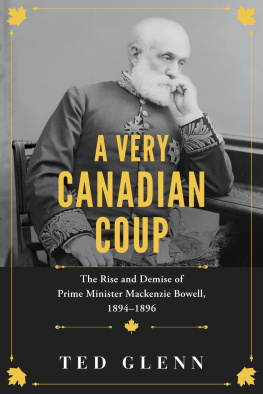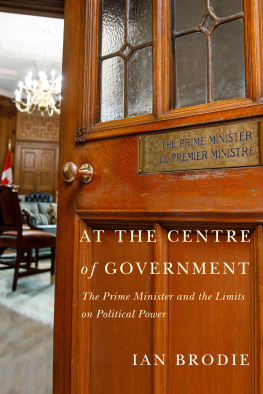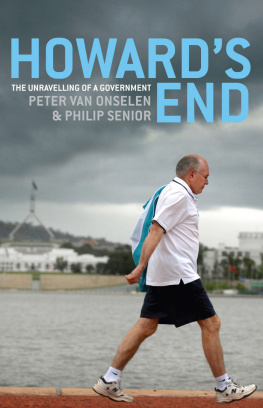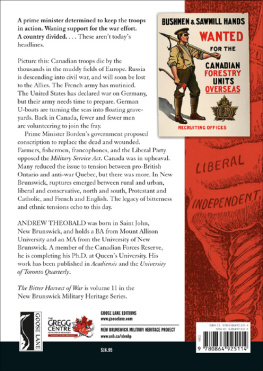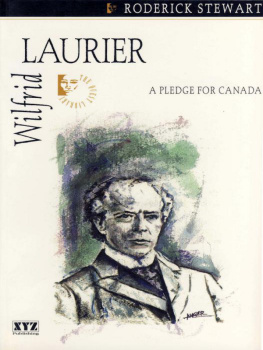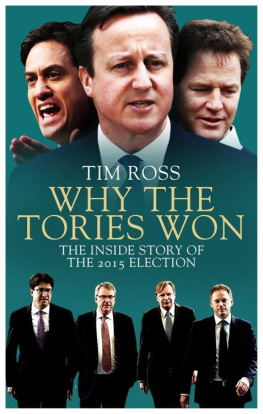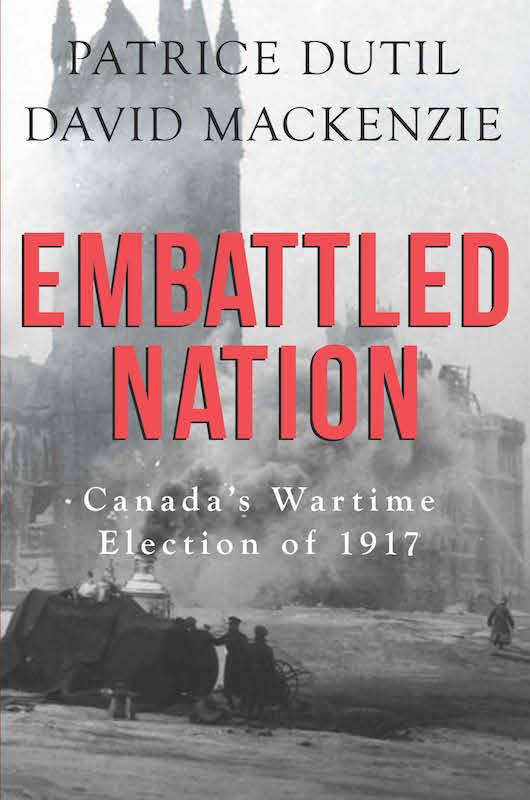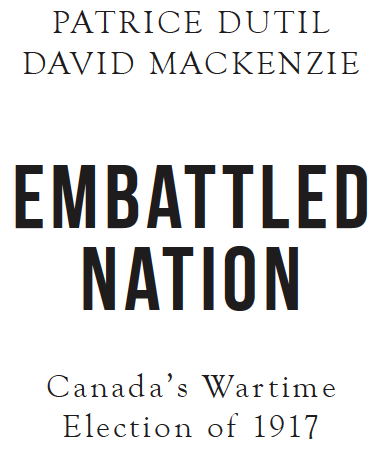Copyright
Patrice Dutil and David MacKenzie, 2017
All rights reserved. No part of this publication may be reproduced, stored in a retrieval system, or transmitted in any form or by any means, electronic, mechanical, photocopying, recording, or otherwise (except for brief passages for purpose of review) without the prior permission of Dundurn Press. Permission to photocopy should be requested from Access Copyright.
Cover image: Wikimedia Commons
Library and Archives Canada Cataloguing in Publication
Dutil, Patrice A., 1960-, author
Embattled nation : Canadas wartime election of 1917 / Patrice Dutil, David MacKenzie.
Includes bibliographical references and index.
Issued in print and electronic formats.
ISBN 978-1-4597-3726-6 (softcover).--ISBN 978-1-4597-3727-3 (PDF).--ISBN 978-1-4597-3728-0 (EPUB)
1. Borden, Robert Laird, Sir, 1854-1937. 2. Laurier, Wilfrid, Sir, 1841-1919. 3. Canada. Parliament--Elections, 1917. 4. Draft--Canada--History--20th century. 5. Political campaigns--Canada--History--20th century. 6. World War, 1914-1918--Political aspects--Canada. 7. Canada--Politics and government--1911-1921. I. MacKenzie, David, 1953-, author II. Title.
FC557.5.D88 2017 971.0612 C2017-904458-3
C2017-904459-1
We acknowledge the support of the Canada Council for the Arts, which last year invested $153 million to bring the artsto Canadians throughout the country, and the Ontario Arts Council for our publishing program. We also acknowledge the financial support of the Government of Canada through the Ontario Book Publishing Tax Credit and the Ontario Media Development Corporation, and the Government of Canada.
Nous remercions le Conseil des arts du Canada de son soutien. Lan dernier, le Conseil a investi 153 millions de dollarspour mettre de lart dans la vie des Canadiennes et des Canadiens de tout le pays.
Care has been taken to trace the ownership of copyright material used in this book. The author and the publisher welcome any information enabling them to rectify any references or credits in subsequent editions.
J. Kirk Howard, President
The publisher is not responsible for websites or their content unless they are owned by the publisher.
Dedication
For our daughters, Nicole, Natalie, Isabelle, Claire, and Elizabeth, and granddaughters Norah and Margot:
May they and their country never live through an election like that of 1917
Epigraph
This election is a referendum. The issue is: Shall we put the whole force of this country behind the war in munitions and men; or shall we put further contributions to the war on the Prussian basis: talk, accompanied by a furious scramble for office?
There are individuals who get purple in the face when told that this is the choice; they insist that there are other important issues which will determine the casting of their votes.
An elector in this frame of mind can give any reason he chooses to his neighbors and his conscience for the ballot he casts; but when it is cast it will be for
Going on with the war, or getting out of the war;
Remembering our troops in the field, or forgetting them;
Keeping faith with the living, or deserting the living and dishonoring the dead.
Manitoba Free Press , November 23, 1917
There is no longer any reason why the whole truth should not be spoken about Quebec. The people of that Province have been rank quitters throughout the whole war. They have been prolific in excuses and evasions and in nothing else.
In short, they have done nothing in the war as yet and they hope to do nothing for the remainder of the war. The general election of Dec. 17 is to decide whether or not they are to take charge of Canada for the remainder of the war. The man who votes against the Union Government votes for Bolsheviki rule in Canada.
Manitoba Free Press , November 28, 1917
Contents
Preface
Acknowledgements
1The Conundrum:
Robert Borden, War, and the Call for an Election
2The Response of French Canada:
Henri Bourassa, Schools, and Nationalities
3The Issue: Conscription
4The Liberals in Opposition:
Wilfrid Lauriers Leadership Tested
5Creating Divisions, Choosing Sides:
The Great Gerrymander
6Framing the Campaign
7The Campaign: French Canada
8The Campaign: English Canada
9The Results
10The Aftermath: Union without Unity
11Conclusion
Appendix 1: Results of the 1917 Election
Appendix 2: Winners of the 1917 Election
Appendix 3: Electoral Maps
Abbreviations
Notes
Bibliography
Image Credits
Preface
December 17 will be Domesday. This contest is not an election but a destiny. Beyond all reasonable doubt it is a conflict for the soul of this nation.
Manitoba Free Press , December 13, 1917
C anadas wartime election of 1917 took place in the worst year of the countrys history. It was a time marked by unprecedented numbers of battlefield deaths in places like Vimy Ridge, Hill 70, and Passchendaele, inconsolable sorrow, sad returns home for injured soldiers, endless tears, broken promises, and broken politics. Embroiled in a world conflict, Canadians debated the issues with all their hearts and marched to the voting polls at a rate never seen before or again equalled in the history of this nation. In its time, this election was interpreted as both the justified victory of a bipartisan effort to transcend politics and as a perversion of democracy. Since then it has been recast as an object lesson that in politics the ends do not always justify the means. Sir Robert Borden, the hero of the day, was seen as an arch-Canadian, a patriot, and a supreme defender of the Empire. Today, he ranks low on the scale of those prime ministers who held office for more than one term and he has been largely forgotten, even by some members of the party that he led for almost twenty years.
The plain fact is that the 1917 election was so central to the shaping of Canadas view of the world that in many ways it still has not entirely passed from politics into history. Some excellent scholarship has been devoted to various aspects of this epic confrontation and we stand on the shoulders of those who have preceded us in imagining and reconstructing the issues and debates, the controversies and tensions, and the smoke-filled backrooms seething with gossip, dire predictions, and speculation.
Remarkably, this is the first book devoted exclusively to the khaki election of 1917, and it joins a short shelf of other studies of Canadian elections. Based on standard secondary authorities, published documents, official papers, and newspapers available in print and on the Internet, it also draws on diaries and private letters held in various archives in Ottawa, Toronto, Montreal, Kingston, Washington, D.C., and London (U.K.). Our aim is to flesh out the realities of this extraordinary campaign by documenting the intentions of the central characters and the unique context in which they lived and, in so doing, we have assumed the responsibility for translating all the original French-language sources. We have also followed a chronological sequence to document the ebb and flow of the passions of the day, mindful that the actors in this drama did not, and could not, know how the story would unfold. The book considers military, cultural, social, and economic factors, which have received so much attention from historians over the years, but we have deliberately chosen to emphasize political developments. We have concerned ourselves particularly with what we consider to be the central themes of this electoral campaign nationalism and imperialism, compulsion and volunteerism, ambition and resistance, war and peace.



